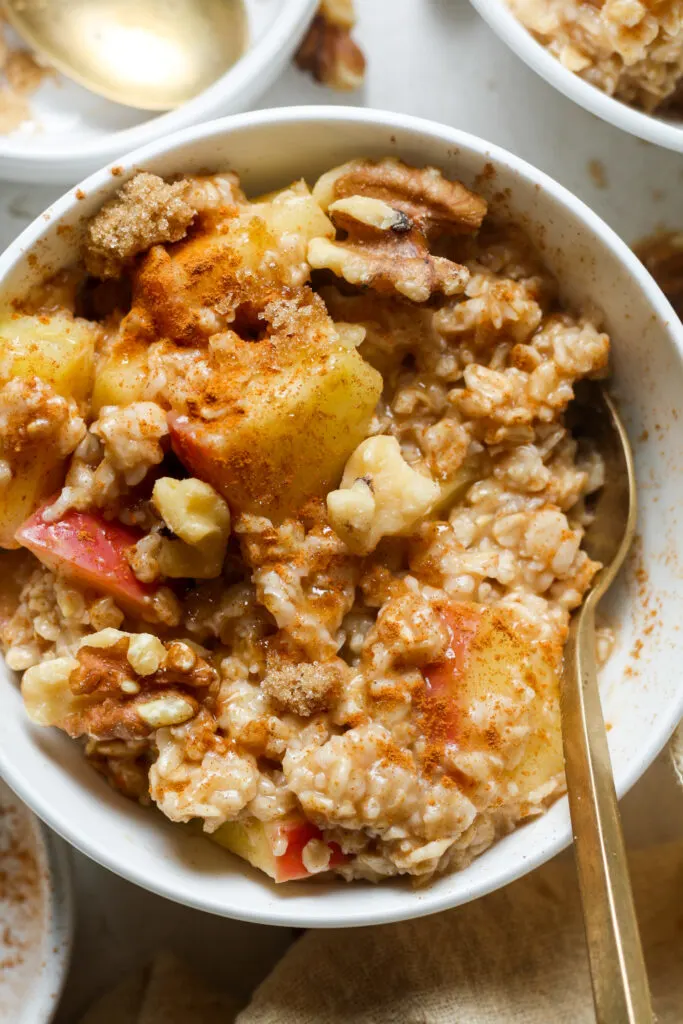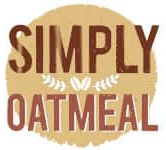Hello! My name is Addison and I am the recipe creator behind Simply Oatmeal. I love eating oatmeal every single day. Overnight oats are a favorite breakfast, while baked oatmeal is my go-to dessert. After realizing I had a gluten intolerance years ago, I began buying certified gluten-free oats.
From there, my love of oatmeal was born. I enjoy baking, cooking, working out, and spending time with family and friends. I am originally from the great state of Maine, but now I called Dallas, Texas home.
You can find more recipes and inspiration on my other websites. Find everything gluten-free on Organically Addison and loads of vegan recipes on Watch Learn Eat. For the best baked goods, check out Girl Versus Dough and find some easy meal prep ideas over on Microwave Meal Prep!

What Recipes Will I Find Here?
This is the blog for all things oatmeal, oats, and overnight oats. You will find the best oatmeal recipes. These recipes are easy, healthy, and delicious. These original homemade recipes feature nutritious everyday ingredients that are easy to find.
This popular oatmeal website features Meals and snacks that are so good that meat eaters, vegans, and picky kids will love!
Commonly Asked Questions about Oats
What is oat made of?
Oats are the whole grain from the cereal plant, Avena Sativa. The grains are harvested and processed for animal feed, skin care products and human consumption.
The whole grain oat is covered by an inedible hull or husk, which is removed to reveal the kernel or oat groat. The groat goes through a variety of processes (milling, steaming, rolling and drying) to become the different types of oats we are commonly familiar with on the shelves at the market.
- What are the different types of oats?
- What are oat groats?
- What is oat bran?
- What are steel cut oats?
- What are rolled oats?
- What are quick oats?
- What are instant oats?
- What are Irish oats?
- What are Scottish oats?
- What is oat fiber?
- What is oat flour?

Are oats really gluten-free?
Yes, oats are naturally gluten-free and are safe for people with a gluten intolerance to eat. However, oats may be contaminated with grains like wheat, barley, and rye. When they are processed on shared equipment or machinery, cross-contamination occurs. For this reason, use certified gluten free oats.
To prevent this problem, only purchase oats that are gluten-free certified. This guarantees the oats have been processed on machinery that is not exposed to wheat products.
What is the difference between oats and oatmeal?
Oats are whole grain kernels or oat groats of the oat plant. Oatmeal is the cereal or porridge that is prepared using cooked oats.
Similar to cornmeal, coarsely ground oat groats are also referred to as oatmeal.
Are oats processed?
Oats are processed in many different forms. Steel cut, rolled oats and quick oats are the most common types of oats, however, they are not the only ones.
The different processes include shelled, cracked, steamed, rolled, and milled. Sizes can range from whole oat groats to old-fashioned rolled oats and also finely ground oat flours.
How do you eat oats?
Simply Oatmeal only shares recipes that use oats that can be eaten in a variety of ways. If you’re looking for fun ways to eat oats, then try our overnight oats, pancakes, muffins, cookies, no-bake bars, no-bake balls, granola, and smoothie recipes.
If you’re looking for a way to spruce up your oatmeal, browse through this list of oatmeal toppings for inspiration to use in your next meal.
What is the healthiest oatmeal?
Oat groats are considered the healthiest oatmeal because they are the least processed and retain the most nutritional value. Although oat groats remain the healthiest oatmeal, they are regarded as being more challenging to cook.
Nutritionally speaking, oat groats are followed by Scottish oats, oat bran, and steel cut oats. Rolled oats are steamed, which helps to lock in the healthy fats. In the end, all types of oats are healthy and you should eat whichever one you enjoy the most.
Is it okay to eat oatmeal every day?
Oats and oatmeal are considered to be one of the main breakfast staples. No wonder why, because there is a long list of oats and oatmeal benefits.
Oats are a nutritional source of protein, fiber, vitamins, and minerals. They promote a feeling of fullness, which may help with weight loss.
Furthermore, they aid in the reduction of total cholesterol, prevent spikes in blood sugar, promote heart health, and boost immunity. This list goes on and on for this powerful whole-grain food.
Does oatmeal cause bloating?
Due to its high-fiber content, oats have a tendency to cause bloating and intestinal gas. This can be overcome by slowly introducing oats into your diet by starting with a small portion and gradually increasing the serving size.
People with gluten sensitivity have been able to safely consume oats, while very few report an issue. However, some people experience oat’s side effects and have been diagnosed with the possibility of having an oats allergy.
